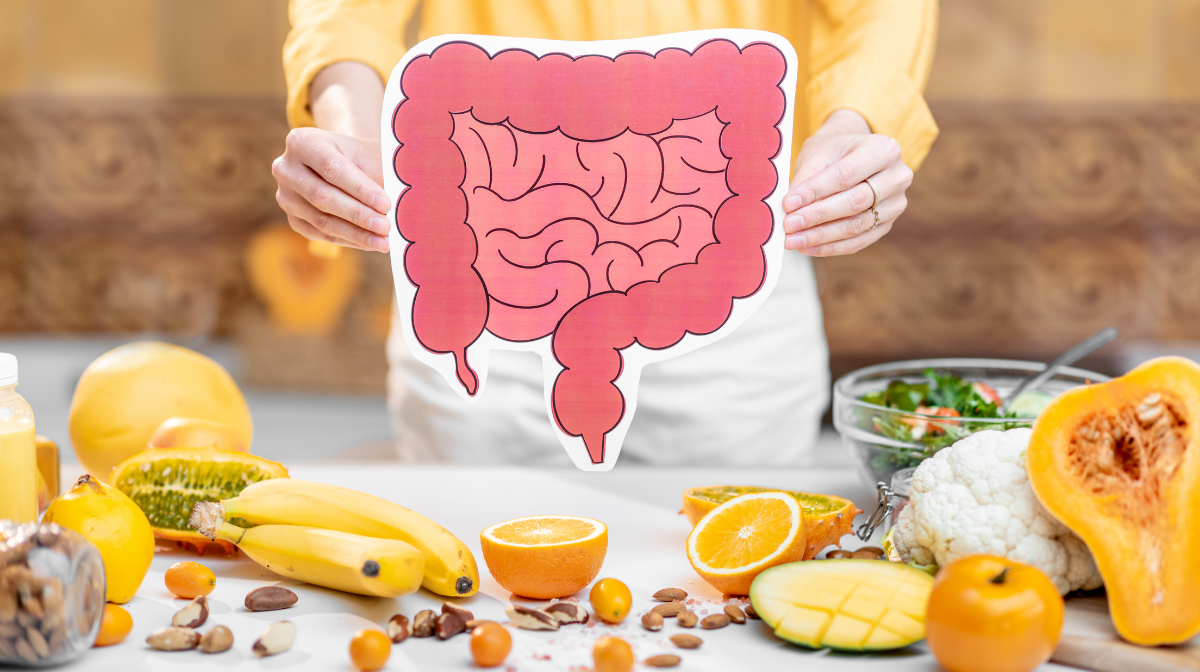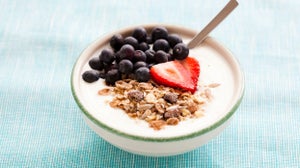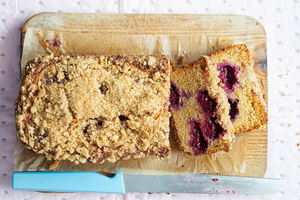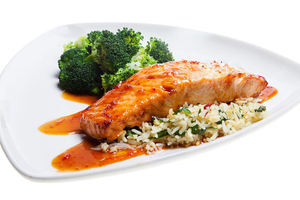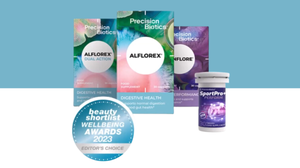If you’ve been researching ways to improve your overall health, chances are you’ve come across the words probiotic and prebiotic. You may have even learned about bad and good bacteria (you guessed it, probiotics are the good kind!), and that your gut needs this ‘good’ bacteria, or probiotics, to function.
Our gut microbiome begins to develop at birth - when we are first exposed to microbes - and it changes throughout our lifetime. You can think of your gut almost like an ecosystem, where different living things work together. It is important to keep your gut microbiome in balance to support your overall gut health. The things we eat - from kefir, to garlic, to probiotic supplements such as Alflorex - can help to increase the number of friendly bacteria in our gut, and improve our overall gut health.
Whatever your existing knowledge is of prebiotics and probiotics - new research about the health benefits of each is being published every day, and it’s always helpful to know more. The more you know, the more you can feel empowered to make positive changes to your health and wellbeing.
Prebiotics vs probiotics: what are the differences?
First thing’s first: what is the difference between a prebiotic and a probiotic? We know that both prebiotics and probiotics are essential for healthy gut function. They share some similarities, but they also play unique and important roles in digestion too.
Probiotics are bacteria - the good kind - which naturally reside in your gut, and which also are found in various foods. First of all, they help to support your immunity, by protecting your gut from the ‘bad’ kind of bacteria.1 Secondly, they work to support enzyme function. Enzymes are proteins that exist through your digestive tract, from your mouth, right through to your intestines. As biological catalysts, enzymes speed up the rate of a specific chemical reaction in a cell, helping to break down the foods you eat into minerals, vitamins, and some of the major building blocks your body uses to function. Without probiotics, digestive enzymes can’t do their job as effectively, which has implications for your digestive function and overall health.2
Prebiotics, however, aren’t bacteria at all. Instead, they’re a kind of fibre that the good bacteria in your gut use to function and grow. In other words, they’re food for your probiotics. So, probiotics, prebiotics, and your gut’s health go hand in hand!
The different health benefits of prebiotics and probiotics
Supporting your overall health is the priority, when it comes to functioning well in everyday life, meeting all the demands work and play can throw at you. We need a healthy gut microbiome to thrive, a healthy gut needs probiotics, and probiotics need prebiotics! By supporting every step along this vital chain, you can look after your gut microbiome, and reap the many health benefits too.
The different health benefits of prebiotics and probiotics come down to their major functions in your digestive system. Probiotics help you to digest food, strengthen your resistance to bad bacteria, and help create vitamins your body can use.3 Whether they are taken in food, or as a supplement, probiotics may even help to alleviate symptoms of irritable bowel syndrome (IBS), support mental health, and enhance digestion.4
Probiotics also support the function of digestive enzymes, which help to break down the food you eat and turn it into energy, vitamins, and minerals your body needs.5 Without the work of both probiotics and enzymes, your gut would not be able to use the raw materials - the building blocks - that exist in food.
Because prebiotics act as food for probiotics, they help these good bacteria grow and thrive, and help to maintain a balanced and healthy gutmicrobiome. They can help your body to break down foods faster, and support healthy cells that make up the lining of your gut. They can also help you to absorb calcium, which your body needs for healthy bones.6
Nutrition
Probiotics and nutrition go hand in hand. In fact, many nutritionists and other health experts will point to the importance of a healthy gut microbiome as an important factor in your overall health. So, how do you maintain a healthy gut?
One of the most important things to know about prebiotics and probiotics is that you can help them both to thrive - and reap all the health benefits that go with that - through your diet and lifestyle choices. This handy guide can help you to inform you about the range of foods you can steam, roast, bake, and barbeque to help maintain a healthy gutmicrobiome.
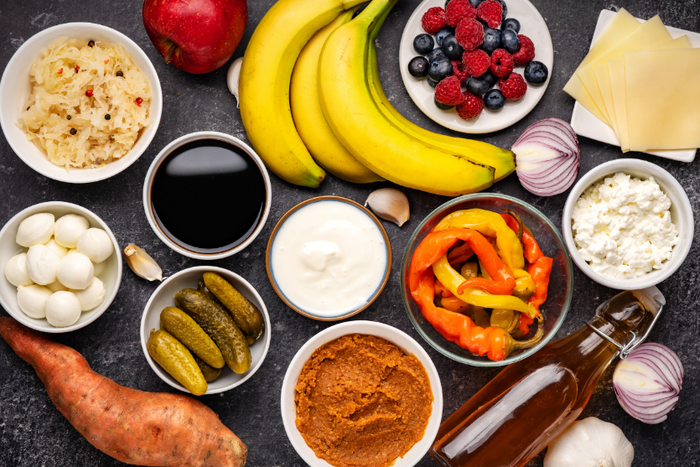
Which foods are high in prebiotics?
Prebiotics are contained in a range of foods, right through from onions to artichokes. You’ll find them in most of your greens, as well as soybeans, garlic, bananas, and whole grains. Incorporating more prebiotics into your diet can be as simple as taking a banana to work as a midday snack, eating sandwiches with whole grain bread, or adding a plate of greens on the side of your evening meal.
Asparagus is packed full of dietary fibre, as well as other good stuff, and eating more of it is a great way to get some more prebiotics and nutrients in your diet. Jerusalem artichokes are also known to be high in prebiotics. This versatile vegetable can be enjoyed in many ways: try a Jerusalem artichoke soup, a risotto, or roast them in olive oil with a bit of lemon, salt, and garlic.
Legumes are also high in prebiotics, and loved by vegetarians, vegans, and meat-eaters alike for their many health benefits. They’re an easy and inexpensive option that can be enjoyed in soups, curries, and chillis.
Of course, we don’t always have time to prepare meals that contain everything we might need for a healthy gut. When you’re looking for something that’s easy to eat on the go, certain nutrition bars are a great high-prebiotic snack made from whole grains, which you can feel good about.
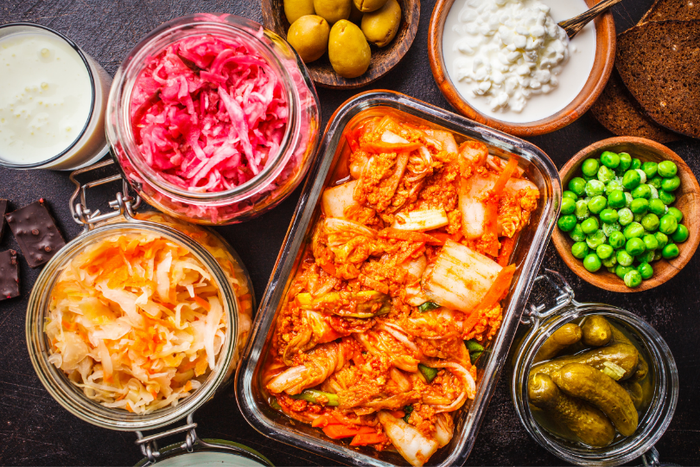
Which foods are high in probiotics?
If you want to eat more foods that are high in good gut bacteria, or probiotics, look no further than fermented foods. Miso, which is made from fermented soybeans, is packed with probiotics, and delicious as a soup base, incorporated in salad dressing, or used to glaze roasted vegetables. Kimchi is another great probiotic-rich food, which comes in a whole array of savoury varieties, and makes for an easy snack, or a side to a Korean meal. Sauerkraut is another great fermented cabbage option that’s delicious in burgers and hotdogs. Plus, you can even make sauerkraut from scratch at home!
Yogurt and kefir are also very high in probiotics - you may notice on some brands of yoghurt the number of live bacterial cultures contained in the product. Be mindful that not all yoghurt contains live bacteria, and it’s important to research the brand you buy to ensure you’re getting all the probiotics and health benefits you can from eating it! Kefir has been linked to good gut health,7 due to the many strains of good bacteria it contains.
Sometimes life gets in the way, and we aren’t always going to eat a diet that’s rich in gut-friendly foods. When enjoying a meal out with friends, or savouring your favourite snacks, taking a dietary supplement can help keep your gut health on track. Our Alflorex® capsules contain live, friendly bacteria, as well as calcium, which contributes to the normal function of digestive enzymes. They’re free from gluten, soya, diary, lactose, GMO - making them suitable for all kinds of dietary requirements.
Alflorex® was discovered and developed by PrecisionBiotics, in partnership with experts of fibre high research at the APC Microbiome Institute. The live culture in Alflorex®,35624®, has been scientifically tested by leading scientists and gastroenterologists. This naturally occurring ‘good’ bacteria is part of the Bifidobacteria family of bacteria, which mothers pass to their babies at birth. It is a friendly live bacteria that is naturally at home in the human gut and has evolved with us over generations. Take one capsule every day for maximum benefit.
Discover More on Gut Health
Sources
https://www.healthline.com/nutrition/probiotics-and-prebiotics#benefits
https://www.healthline.com/nutrition/11-super-healthy-probiotic-foods#TOC_TITLE_HDR_3
https://www.medicalnewstoday.com/articles/323490#benefits-and-side-effects-of-probiotics
https://my.clevelandclinic.org/health/articles/14598-probiotics
